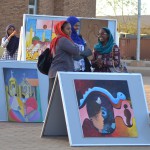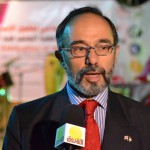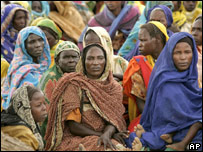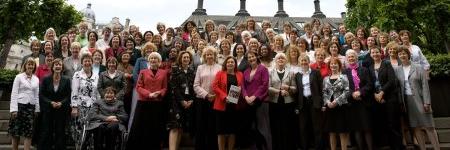12th December 2012
Human Rights Day 2012
I spent the evening marking International Human Rights Day 2012 at an event at Afhad University for Women organised by SEEMA (a Sudanese women’s rights organisation) and supported by the British embassy.
International Human Rights Day provides the opportunity for people to celebrate human rights and to advocate for the full enjoyment of those rights for everyone, everywhere. I think that this year’s theme – Make Your Voice Count has a particular resonance in Sudan. ‘Make Your Voice Count’ is about the equal right that all people have – men and women, young and old, minorities and majorities, those who are fully fit or have disabilities – to make their voices heard in public life and to be included in political decision-making.
Thinking about this in the context of Sudan brings many issues to mind. But given the event I attended last night, which celebrates women’s participation in political and public life, I would like to reflect here on the contribution of women in politics and, in particular, in peace processes in Sudan.
Women played a remarkable role in the last elections. In at least one State, more women voted than men. As we move towards the next elections the UK looks forward to working with these women and more who want to make their contribution. I know many examples of truly inspiring women working in politics and policy-making in Sudan, including in government as ministers, as senior figures within political parties and, as staff within civil society organisations, academic institutions and my own Embassy. The Comprehensive Peace Agreement between Sudan and South Sudan stipulated that there should be 25% representation by women at all levels of government and I saw the impact of this when I visited Sudan’s National Assembly. But in other respects, I am struck by the near total absence of women from high-level political decision making processes in Sudan.
This exclusion is particularly marked in conflict resolution and peace-building work. When members of my staff meet with local peace-building forums in Sudan (whether focused on Darfur, the East or South Kordofan and Blue Nile) the delegations are almost exclusively male. At previous Sudan-South Sudan peace talks in Addis Ababa, the delegations from both countries were entirely made up of men.
And yet women have an absolutely vital role to play in the prevention and resolution of conflict as recognised in UN Security Council Resolution 1325, which urges Member States to ensure increased representation of women at all decision-making levels for the prevention, management, and resolution of conflict. Internationally, we can see that where women are empowered to contribute to peace-building, they have made a huge difference. Just look at the role of women in bringing about peace and reconstruction in Liberia.
I see for myself the essential role women can play in policy-making when I look at the efforts of women working in civil society, universities and in the legal profession in Sudan who work to improve the human rights situation and to promote good governance, the rule of law and democracy in their country. And, through the UK Aid supported Safety and Access to Justice Programme, I know that good work is being done to increase women’s access to justice. In the last year, as a result of this programme, 273,000 women and girls have better access to improved policing and justice. .
In the UK, we also need to improve the participation of women at senior levels in government, business and parliament. In the UK House of Commons, for example, only 21% of Members are women, and only 12.5 per cent of directors in FTSE 100 companies are female. There are significant efforts underway to tackle this imbalance, including through recruitment policies, targeted career development, increased flexible working, and equal pay legislation. But there is still a long way to go.
I discussed my perceptions with those attending the event last night. But I would also be keen to hear your views on whether women can and should play a more prominent role in Sudan. Please comment on the blog or Facebook.





am proud of your speech , you touch very important point , the participation of the women. what I want say in Sudan particular the government don’t give the women her rights and the, and her participation in the parliament it her advocacy straggling to find this 25%, so we need more working so as to participate in the negotiation and high level of decision making.
really we miss this important celebration day, as we know most initiatives are self effort and women right still in the early stage and need a lot of awareness all people to cooperate to promote this issue, greeting to Sheikh Babiker Badri who do basic building of girls education in Sudan, more more
Greeting for Mr Ambassador Dr Peter Tibber for support gender right and human right through on going celebrations.
Hala British Ambassador in Port Sudan welcome in our city
Wise words Yr Excellency
What I liked most is the fact that you avoided writing from a position of “perfection”. What we find illogical is listening to lessons in politics
from diplomats and leaders who assume that they stand on the moral high ground.After a long list ( beginning with the WMDestruction lie, abu Ghraib, Guantanamo Bay and leading to the Libor and blacklisted construction workers) the West should learn to be more modest when offering advice.
Your blog is balanced ,yr excellency ,because you acknoweldge that your
country is not perfect.
Two footnotes:
1-Unamid did a good job in trying to convince women singers in Darfur
(known as the Hakkamat) to sing for reconciliation not incitement of feelings against other tribes.
2-When Sheikh Babiker Badri the founder of AlAhfad started the teaching of girls in Rufaa , the district commisioner was not suppotive
because he feard an angry backlash from the people. Sheikh Babiker
disagreed and started with his own relatives,forming the nucleus of what you have visited
Thank you for bringing this issue of women’s rights and the importance of their participation in public life to our attention. We need to start with gender consciousness in these places of power like the ministries etc. Do women understand their rights, do they have an idea about the strides in legislation around issues of sexual harassment or equal pay or reproductive health that are being made elsewhere? I think at a very basic level some sort of gender awareness training in these key places could make a difference.